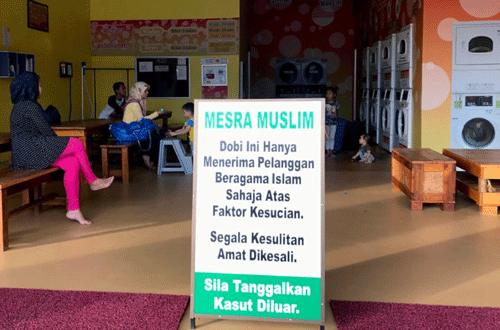Launderette owner: I put up signboard to uphold my duties as a Muslim

Launderette owner: I put up signboard to uphold my duties as a Muslim
This article talks about a launderette owner in Maur, Malaysia, who after one and a half years of business placed a sign in front that states "Muslim-friendly. This laundrette only serves Muslim patrons due to (religious) purity issues. Any inconvenience is deeply regretted. Please remove your shoes before entering." His patrons are for the most part Muslim and some concerns about impurities (najis) arose among a few of them. This combined with the owner's own thoughts (especially after reading a magazine article on the issue) sent him to visit the Domestic Trade, Cooperatives and Consumerism Ministry to ask if it was okay for a such a sign to be placed. After receiving the go-ahead, the owner did so and found (in the last 10 days or so) no significant change in business. Nonetheless, the move has been met with much criticism, some calling it "extreme" and a "misinterpretation of Islamic law". The owner himself will stick with the change, especially because other launderettes are nearby for non-Muslims.
The reason why this article is so interesting is because it explores the intersection between the state, religiosity, and economics on a micro-level. Should the state even allow this move for the fact that (even if Malaysia is not secular in the sense of France or even the US) it creates an inequality among citizens? Or is the question of access almost negated because of the prevalence of launderettes. That is to say, looking at this from an economic standpoint, the owner's plan perhaps could be a good business idea. His base is nearly all Muslim and this is him just catering towards them. Johor Mufti Datuk Mohd Tahrir Samsudin makes a claim that such a move actually opens the business up to Muslims who were concerned about these impurities, thus opening access for them by restricting access to non-Muslims, much to the anger of some people. How should Malaysia balance such an issue? Should it allow Muslim-only launderettes as well as making concessions like these for other traditions (that is say if Buddhist also had similar thoughts on impurities, the state would also allow Buddhist-only launderettes)? A move like that would bring Malaysia in line with an Indian style of secularism. But also interesting is how the owner came to implementing this, getting his religious information from a magazine. How does religion and religious information spread in Malaysia and how does it affect a person's religiosity? Though this article only involved a man and his small launderette, it shows how Malaysia is currently trying to balance these concepts and it would be interesting to continue to find articles that show other methods they use.
Comments
This is a fascinating post. It immediately brings to mind several comparisons.
1. First it makes me think of the rise of Muslim gated communities in Malaysia and Indonesia. There is an emergent literature on this. It can also be compared to the emergence of caste-specific communities in India. In all these cases, the concept of purity and pollution tends to play a central role. It becomes complicated because it is possible to make a case on religious grounds that the desire to prevent certain forms of contact are religiously proscribed. As a thought experiment, one might imagine that it is fair for a vegetarian to request that their food not be prepared with spoon used to stir beef soup. But would it then be fair for that vegetarian to request that they not come into contact with a person who has consumed beef? These are the issues that keep societies under constant flux, and that keep legal systems in business.
2. It also reminds me of the debates in the US about wedding cake bakers who have refused to bake cakes for same-sex couples, in clear violation of US law, but based on deeply help religious convictions. There too, to paraphrase your witty but profound line “it may just be a small matter of a wedding cake…”
Pages